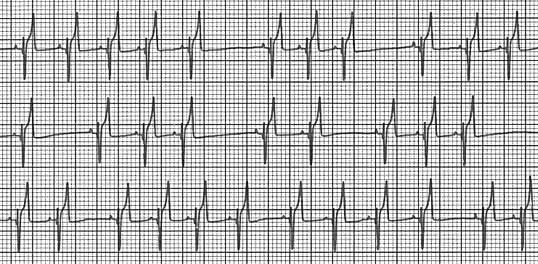Electrocardiology
-
Basics of ECG Interpretation11 Topics
-
Normal ECG Parameters
-
ECG Interpretation of Chamber Enlargement4 Topics
-
Dysrhythmias
-
Bradycardia
-
Heart Block3 Topics
-
Sick Sinus Syndrome
-
Tachycardia8 Topics
-
Hyperkalemia
-
Myocardial Hypoxia/Ischemia
-
Low Amplitude QRS Complex
-
Wide QRS Complex
-
Bundle Branch Block
-
Differentials for ECG Abnormalities
Sinus Arrhythmia
A sinus arrhythmia is a rhythm of sino-atrial origin (as defined above) that produces a phasically irregular ventricular rate as a result of a phasically irregular sino-atrial rate. On the ECG, the QRS to QRS interval varies and there is a P wave for every QRS complex.

Etiology: Most cases of sinus arrhythmia are phasic and associated with respiration. The rate increases with inspiration and decreases with expiration due to the influence of changes in vagal tone. Individuals with respiratory disease may have an augmented or pronounced sinus arrhythmia.
Consequences: This is a normal finding, and particularly common in fit individuals. The finding of sinus arrhythmia on ECG confirms the presence of an arrhythmia but establishes that this irregularity is not pathologic. No treatment is required.
Treatment: none required

